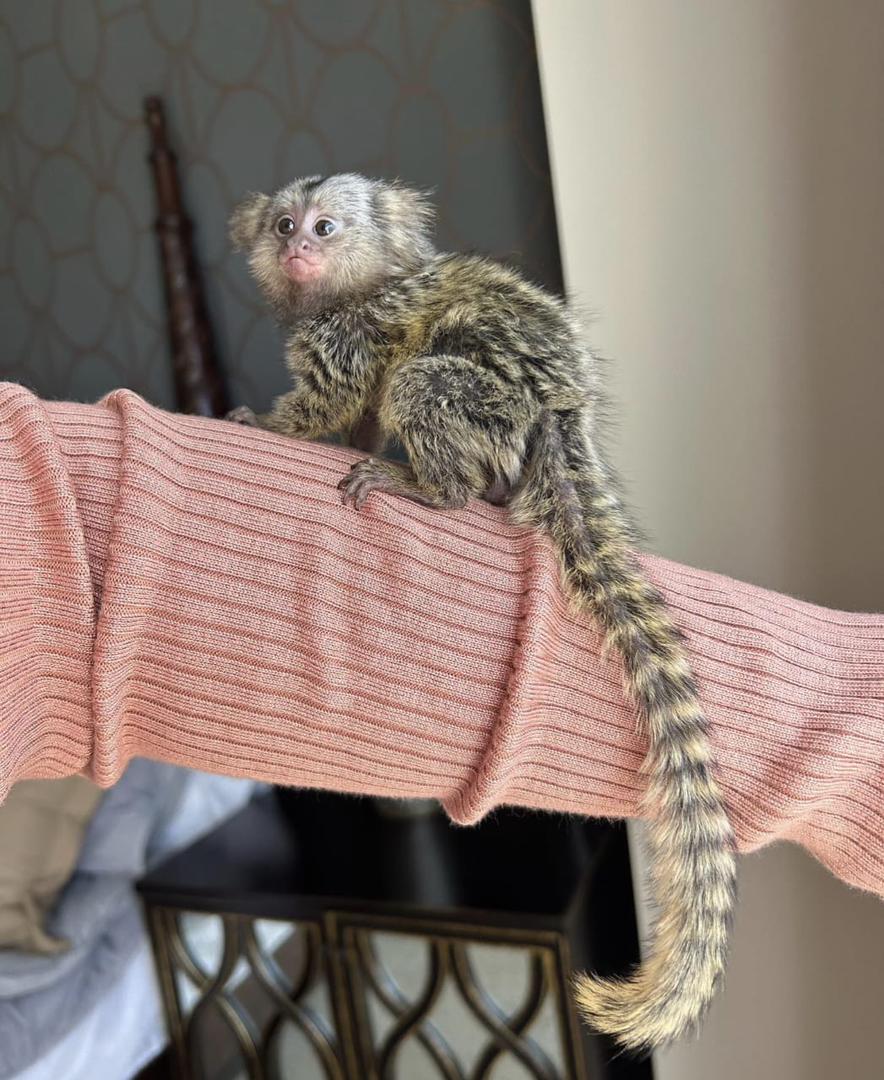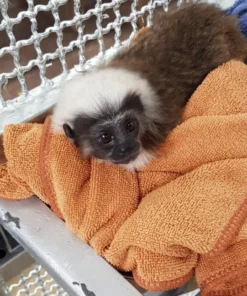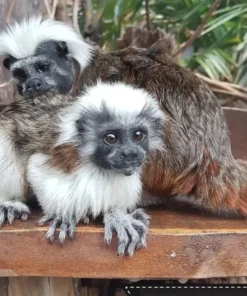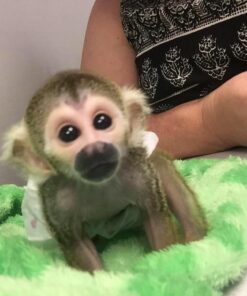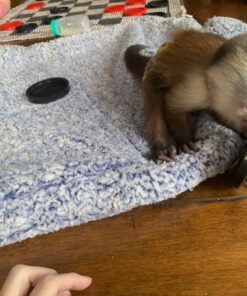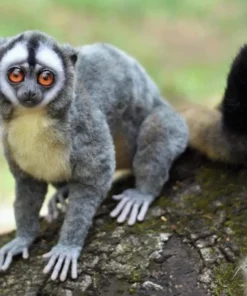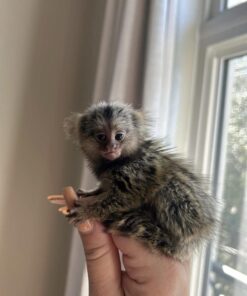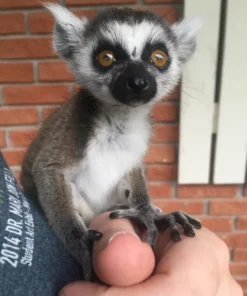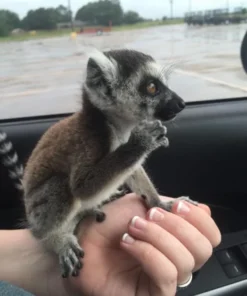$500.00 – $1,300.00
GENDER: female
SPECIES: Marmoset Monkey (Finger Monkey)
PET’S AGE: 10 weeks old
Birth Certificate Available
Full Vet Records Available (1 year health guarantee)
CHARACTERISTICS: young marmoset on sale, vet checked, hand raised and well trained, companion, cute, exotic, handfed, house trained, pet, playful, tamed, ready for new home, friendly, lovely and easily associate with people, very adaptable and sociable since she has been raised amongst our kids and other pets such as birds, cats and dogs, response to name. She also comes with play toys, care and food menus.
Marmoset Monkey For Sale (Finger Monkey For Sale)
Finger Monkeys: The Ultimate Guide to These Tiny Primates
Finger monkey price, scientifically known as pygmy marmosets (Cebuella pygmaea), are one of the most fascinating and adorable creatures in the animal kingdom. Native to the rainforests of South America, these tiny primates have captured the hearts of animal lovers worldwide due to their small size and engaging behavior. Finger monkeys are among the smallest primates in the world, making them particularly attractive to those interested in exotic pets.
However, owning a finger monkey comes with significant responsibilities and challenges. Before you consider searching for a “finger monkey for sale,” it’s crucial to understand what goes into caring for these unique creatures, the cost involved, and what to expect as they grow. This article will dive deep into the world of finger monkeys, including their behavior, care requirements, and the reality of having one as a pet.
What is a Finger Monkey?
A finger monkey is another name for the pygmy marmoset, a small primate that weighs between 3 to 5 ounces and measures around 4 to 6 inches in length, excluding its tail. Despite their small size, finger monkeys are social, highly active, and intelligent animals that live in the treetops of the Amazon rainforests in Brazil, Colombia, Ecuador, and Peru.
Their name, “finger monkey,” comes from the fact that they can easily wrap their small hands around a human finger. These monkeys are part of the Callitrichidae family, which also includes tamarins and other species of marmosets. They have a unique ability to leap from tree to tree, often traveling several feet in a single jump.
Behavior and Social Structure
In the wild, finger monkeys live in groups of up to nine individuals, with a complex social structure that includes a dominant breeding pair. The group members help care for the young, which is essential for their survival in the wild. Pygmy marmosets are highly social animals, relying on their group for grooming, communication, and protection. This is an important consideration for anyone thinking of adopting one as a pet.
Finger monkeys are vocal animals, using a series of high-pitched squeaks and calls to communicate with one another. In the wild, these calls are used to warn others of predators or to mark their territory. Their vocal nature can be a challenge for pet owners, as they may not be suited to environments where quiet is necessary, such as apartments.
The Appeal of Owning a Finger Monkey
The idea of having a tiny monkey clinging to your finger is undoubtedly appealing. These adorable animals have large, expressive eyes, tiny bodies, and a playful nature that endears them to many. But despite their cuteness, owning a finger monkey comes with serious challenges and responsibilities.
Before searching for a “finger monkey for sale,” potential owners need to consider the ethical and practical aspects of owning such a complex animal. Like all primates, finger monkeys have specialized needs that can be difficult to meet in a home environment.
What to Consider Before Buying a Finger Monkey
While the idea of owning a finger monkey might seem appealing, there are many factors to consider before bringing one into your home. Here are a few key considerations:
Finger Monkey Price*
Finger monkeys are rare and exotic, making them expensive pets. The “finger monkey price” can range from $4,000 to $8,000, depending on factors like the monkey’s age, breeder reputation, and location. This price does not include the ongoing costs of food, habitat, toys, and veterinary care, which can be significant.
Furthermore, finger monkeys require specialized veterinary care, which can be costly. Owners will need to find an exotic pet veterinarian experienced in primates, which may not be available in all areas.
Social and Environmental Needs
In the wild, finger monkeys live in complex social groups and spend much of their time high in the trees. To replicate this in captivity, owners will need to provide an environment with plenty of vertical space for climbing and leaping. A large, multi-level enclosure with branches, ropes, and other climbing structures is essential for their well-being.
Additionally, finger monkeys are social animals that thrive on interaction with their group members. If kept alone, they may suffer from loneliness and depression. Many experts recommend that finger monkeys be kept in pairs or small groups to meet their social needs.
Dietary Requirements
Finger monkeys have a specialized diet that includes tree sap, gum, fruit, insects, and small animals. Replicating this diet in captivity can be challenging, as they need a mix of protein and carbohydrates to stay healthy. Many owners provide a diet that includes commercial primate pellets, fruits, vegetables, and insects like crickets or mealworms.
Providing a balanced diet is essential to prevent malnutrition or other health problems. A finger monkey’s diet must be closely monitored, and they may require supplements to ensure they receive all the necessary nutrients.
Legal Restrictions
Before you purchase a finger monkey, it’s essential to check your local laws regarding exotic pets. In some areas, owning a primate like a finger monkey is illegal or requires special permits. Even in states where it is legal, there may be restrictions on how they are kept or sold.
The Reality of Raising a Finger Monkey
Raising a finger monkey is not for the faint of heart. These animals require constant attention and care, and their long lifespan (up to 12-15 years in captivity) means a long-term commitment. Finger monkeys are known for their intelligence, but they can also be destructive and difficult to manage if not properly trained and socialized.
Some finger monkeys may develop behavioral issues, such as biting or aggression, especially if they are not given enough stimulation or if their social needs are not met. They are not like dogs or cats and require a very different approach to care and handling.
Newborn Finger Monkeys
“Newborn finger monkeys” are especially fragile and require round-the-clock care. If you are purchasing a newborn finger monkey, it’s vital to ensure that the baby has been weaned properly and is eating solid food. Hand-rearing a newborn primate is a delicate process that requires expertise, so it’s recommended to only adopt from reputable breeders who can provide guidance and support.
Newborn finger monkeys are highly dependent on their caregivers and will need to be bottle-fed if they have not yet been weaned. They will also need a warm, safe environment that mimics the conditions they would experience in the wild. As they grow, they will become more active and require more space to explore and play.
Full-Grown Finger Monkeys
While finger monkeys may remain small in size, a “full-grown finger monkey” is still a handful. These tiny primates are highly active and need plenty of space to climb, jump, and explore. Their intelligence also means they need constant mental stimulation to prevent boredom and destructive behaviors.
Even when fully grown, finger monkeys can exhibit behaviors like biting or throwing objects if they feel threatened or bored. Proper training, socialization, and care are essential to ensuring that a full-grown finger monkey remains a happy and healthy companion.
Where to Find Finger Monkeys for Sale
If you’re serious about finding a “finger monkey for sale,” it’s crucial to do your research and only purchase from reputable breeders. Avoid buying from illegal or unethical sources, as this can lead to health issues or behavioral problems in the monkey.
Breeders should be able to provide information about the monkey’s health, diet, and socialization. They should also be willing to offer ongoing support and guidance to new owners. In addition to breeders, you may also find finger monkeys through exotic pet rescues or sanctuaries, though this is less common.
The Finger Monkey Price Range
As mentioned earlier, the “finger monkey price” can range from $4,000 to $8,000 or more. This price reflects the rarity of the animal, as well as the cost of breeding and raising these exotic primates. In addition to the initial purchase price, potential owners should budget for ongoing expenses like food, habitat, veterinary care, and enrichment.
Conclusion
Owning a finger monkey is a unique and challenging experience that requires a deep understanding of their behavior, social needs, and care requirements. While the idea of having a tiny monkey clinging to your finger is appealing, these animals are not simple pets. They require a significant investment of time, money, and effort to ensure they live healthy and fulfilling lives.
If you’re still considering purchasing a “finger monkey for sale,” be sure to research breeders carefully, consult with an exotic pet veterinarian, and prepare for the long-term commitment of caring for one of these incredible creatures. With the right care and environment, a finger monkey can be a delightful and engaging companion for many years to come.
Pros and Cons of Owning a Finger Monkey
Like any exotic pet, owning a finger monkey comes with its unique set of pros and cons. It’s essential to weigh these factors carefully before making a decision.
Pros:
1. *Adorable Companions*: Finger monkeys are undeniably cute, and their tiny size makes them even more appealing. They form strong bonds with their owners, which can be incredibly rewarding for those who invest time and effort into their care.
2. *Unique Pet*: Finger monkeys are rare, so owning one can be a status symbol or an exciting conversation starter. They’re not like your average pet, making them a unique and interesting addition to your household.
3. *Intelligent and Engaging*: These primates are very smart and curious, meaning they can learn tricks, solve problems, and explore their environment in fascinating ways. Watching their playful nature can be highly entertaining.
4. *Interactive*: Finger monkeys thrive on interaction, making them great companions for those who want an active and engaging pet. They are affectionate, and their need for socialization can create a strong bond between owner and pet.
Cons:
1. *High Maintenance*: While they’re small, finger monkeys are high-maintenance pets. They require a lot of attention, specialized care, and constant supervision to ensure they stay healthy and happy.
2. *Expensive*: The cost of a finger monkey, including the price of purchase, veterinary care, food, and habitat setup, can be extremely high. It’s not a one-time expense—keeping a finger monkey can drain your finances over time.
3. *Legal Restrictions*: In some regions, it’s illegal to own a primate. Even where it’s legal, there may be strict rules and regulations to follow. Always check local laws before purchasing a finger monkey.
4. *Behavioral Challenges*: Finger monkeys can develop behavioral issues if they are not adequately socialized or given enough mental and physical stimulation. They may bite, scratch, or become aggressive, especially as they reach adulthood.
5. *Long Commitment*: A finger monkey can live up to 12-15 years in captivity. This is a long-term commitment, and they require constant care throughout their lives, making them unsuitable for owners who aren’t prepared for the responsibility.
Finding a Finger Monkey for Sale
If you’ve done your research and are ready to proceed with purchasing a finger monkey, the next step is finding a reliable and ethical source. While it’s tempting to look for the lowest “finger monkey price,” it’s crucial to prioritize the well-being of the animal over cost.
Here are some steps to find a reputable breeder or source:
Do Extensive Research*
Start by looking online for licensed breeders with a good reputation. Look for reviews and testimonials from previous customers to ensure the breeder treats their animals ethically and follows best practices.
Check Credentials*
Make sure the breeder has all the necessary permits and licenses. You can also ask about the lineage of the monkeys they sell to avoid any genetic issues. Reputable breeders will be transparent and open to answering all your questions.
Visit the Breeder*
Whenever possible, visit the breeder’s facility to see firsthand how the animals are kept. This will give you a better idea of the living conditions and whether the monkeys are well-cared for.
Ask for Health Records*
Reputable breeders should provide health records for the finger monkey you’re buying. Ask if the monkey has been examined by a veterinarian, and ensure it has received the necessary vaccinations and treatments.
Post-Purchase Support*
A good breeder will offer guidance and support even after you’ve taken the monkey home. They should provide advice on diet, care, and behavior and be available for any questions or concerns you may have.
Alternatives to Buying a Finger Monkey
If you’re not sure you’re ready for the responsibility of a finger monkey, there are other ways to experience primates without making a long-term commitment. Some sanctuaries and rescue centers allow visitors to interact with monkeys in a controlled environment, where the animals are cared for by trained professionals.
Alternatively, you can consider supporting conservation efforts aimed at protecting wild finger monkeys and their natural habitats. By contributing to these organizations, you can help ensure these incredible creatures continue to thrive in the wild, without the challenges of keeping one as a pet.
Final Thoughts
Owning a finger monkey is a significant commitment that requires time, money, and dedication. While they are undeniably adorable and captivating, they are also complex animals with specific needs that must be met to ensure their well-being. Potential owners must carefully consider whether they can meet these needs before searching for a “finger monkey for sale.”
By understanding the responsibilities and challenges that come with owning a finger monkey, you can make an informed decision about whether this exotic pet is right for you. Remember, adopting any animal is a lifelong commitment, and it’s essential to prioritize their health and happiness above all else.
Frequently Asked Questions
How much does a finger monkey cost?*
The price of a finger monkey can range between $4,000 and $8,000, depending on the age, breeder, and location. This price excludes ongoing expenses like food, habitat, and veterinary care.
Is it legal to own a finger monkey?
The legality of owning a finger monkey varies by location. In some places, it’s illegal to keep primates as pets, while in others, you may need a special permit. Always check local laws before purchasing a finger monkey.
What do finger monkeys eat?*
Finger monkeys have a specialized diet that includes tree sap, gum, fruit, insects, and small animals. In captivity, they can be fed a combination of primate pellets, fruits, vegetables, and insects like crickets or mealworms.
Do finger monkeys make good pets?*
Finger monkeys can make engaging pets for experienced owners who are prepared for their unique needs and challenges. However, they require a lot of attention, care, and socialization, making them unsuitable for those who cannot meet these demands.
How long do finger monkeys live?*
Finger monkeys can live up to 12-15 years in captivity. This is a long-term commitment, and potential owners should be prepared for the responsibility of caring for the animal throughout its life.
In conclusion, finger monkeys are fascinating, intelligent, and adorable animals, but they come with a set of challenges that potential owners must carefully consider. If you’re committed to providing the necessary care, environment, and attention, a finger monkey could be a rewarding addition to your household. However, it’s essential to remember that these are not low-maintenance pets, and their well-being should always be the top priority.
| Purchase Option | 100% Payment, Reserve |
|---|
Related products
MONKEYS FOR SALE
MONKEYS FOR SALE
MONKEYS FOR SALE
MONKEYS FOR SALE
MONKEYS FOR SALE
MONKEYS FOR SALE





